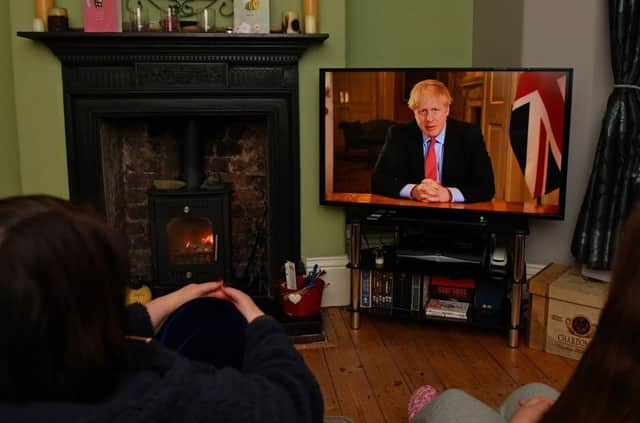Here's the latest guidance on whether you should go into work after the UK was placed on lockdown


The Prime Minister has placed the UK on lockdown as the government seeks to stem the spread of coronavirus, preventing travel to and from work unless it is essential.
Speaking in an address to the public on Monday night Boris Johnson insisted that members of the public stay at home, outlining only a handful of exceptions.
Advertisement
Hide AdAdvertisement
Hide AdOne such exception was that members of the public were still allowed to leave their house to travel to and from, but only “where this is absolutely necessary and cannot be done from home”.
‘If you are working on site, you can continue to do so’
Secretary of State for Housing, Communities & Local Government Robert Jenrick went into more detail on who should and shouldn’t go into work.
He tweeted: “If you can work from home, do so.
“If you are working on site, you can continue to do so. But follow Public Health England guidance on social distancing.”
This suggests, though doesn’t explicitly state, that the likes of construction workers should continue to go to work, but maintain social distance while doing so.
Advertisement
Hide AdAdvertisement
Hide AdWhat is essential work?
Last week the government announced the closure of schools to all pupils with the exceptions of children of “key workers”.
These key workers will continue to be allowed to attend work under lockdown rules, though should work from home if possible.
Who is classed as a key worker?
Here is a full list of key workers:
Health and social care
Including doctors, nurses, midwives, paramedics, social workers, care workers, and other frontline health and social care staff required to maintain the UK’s health and social care sector
Education and childcare
This includes nursery and teaching staff, social workers and those specialist education professionals who must remain active during the COVID-19 response to deliver this approach
Key public services
Advertisement
Hide AdAdvertisement
Hide AdWhich includes those essential to the running of the justice system, religious staff, charities and workers delivering key frontline services, and journalists and broadcasters who are providing public service broadcasting
Local and national government
This only includes those administrative occupations which are essential to the effective delivery of the COVID-19 response or delivering essential public services, such as the payment of benefits
Food and other necessary goods
Those involved in food production, processing, distribution, sale and delivery as well as those essential to the provision of other key goods
Public safety and national security
This includes police and support staff, Ministry of Defence civilians, contractor and armed forces personnel, fire and rescue service employees, National Crime Agency staff, those maintaining border security, prison and probation staff and other national security roles
Transport
Advertisement
Hide AdAdvertisement
Hide AdThose who will keep the air, water, road and rail passenger and freight transport modes operating during the COVID-19 response, including those working on transport systems through which supply chains pass
Utilities, communication and financial services
This includes staff needed for essential financial services provision, the oil, gas, electricity and water sectors, information technology and data infrastructure sector and primary industry supplies to continue during the COVID-19 response, as well as key staff working in the civil nuclear, chemicals, telecommunications, postal services and delivery, payments providers and waste disposal sectors
Work from home if you can
The government have encouraged businesses and workplaces to encourage their employees to work at home, wherever possible.
Simply put, if you can work from home you are now compelled to do so.
Advertisement
Hide AdAdvertisement
Hide AdUnsure if your work is necessary? Stay at home and contact your employer
If it is possible to work from home now employers should actively insist that you do so.
If you have been continuing to work on site, and have not yet been contacted by your employer, you should follow government instruction and stay at home, contacting your employer when possible.
As an employee you are entitled by law to request flexible working which could be used to ask to work from home. Given the serious nature of the government’s instructions most employers should accept your request to work from home if they haven’t already.